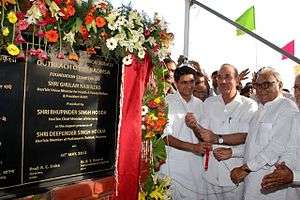All India Institute of Medical Sciences, Delhi
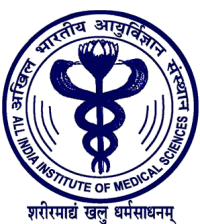 Official seal of AIIMS Delhi | |
| Motto |
Sharīramādyam khalu dharmasādhanam (from the Kumārasambhava of Kālidāsa, [5.33]) |
|---|---|
Motto in English | "The body is indeed the primary instrument of dharma." |
| Type | Public |
| Established | 1956 |
| President | Minister for Health and Family Welfare |
| Dean | Y K Gupta |
| Director | Randeep Gulerian |
| Location |
New Delhi, Delhi, India 28°33′54″N 77°12′36″E / 28.565°N 77.21°E |
| Campus | Urban |
| Language | English |
| Website | www.aiims.edu |
All India Institute of Medical Sciences, Delhi (AIIMS Delhi; IAST: Akhil Bhāratiya Āyurvignan Samsthān Dillī) is a medical college and medical research public university based in New Delhi, India. AIIMS was established in 1956 and operates autonomously under the Ministry of Health and Family Welfare.
History
AIIMS Delhi is governed by the All India Institute of Medical Sciences Act, 1956.[1] AIIMS was established in 1956 in New Delhi after then Prime Minister of India Jawaharlal Nehru's initial proposal to set up the institute in Calcutta was turned down by the then Chief Minister of West Bengal Bidhan Chandra Roy.[2] It was the vision of Rajkumari Amrit Kaur, the first Health Minister of India, to establish an institute of such nature in India.
Rankings
| University and college rankings | |
|---|---|
| Medical - India | |
| India Today (2017)[3] | 1 |
| Outlook India (2017)[4] | 1 |
| The Week (2017)[5] | 1 |
AIIMS Delhi was ranked first among medical colleges in India in 2017 by India Today,[3] Outlook India[4] and The Week.[5]
Achievements
- AIIMS is the first Indian center to perform a successful cardiac transplant. The surgery was performed by P Venugopal, the ex director of AIIMS in 1994.[6]
- AIIMS is a leader in stem cell therapy, especially cardiac and neurological.[7][8][9]
- AIIMS has India's first and only minimally invasive surgery training centre, under collaboration with Germany.[10]
- It is a pioneer of robotic surgeries in India, particularly the Da Vinci system for urology, and robotic CTVS.[11][12]
- The first in-vitro fertilisation facility in the public sector set up at the All-India Institute of Medical Sciences in February 2008.[13]
- The Centre for Dental Education and Research at AIIMS has been designated as the only WHO CC in South East Asia region. There are a total 15 such centres in the world. It is also designated as National Centre of Excellence for Implementation of National Oral Health Programme in the country
- First to develop DNA profiling lab (1990) and a medical toxicology lab in a Medical college (1986).
Campuses
AIIMS Delhi main campus
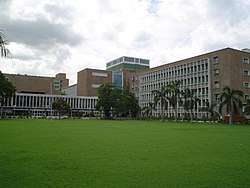
AIIMS is located in Ansari Nagar in Delhi. It is adjacent to the South Extension-II market, and lies on the south-eastern quadrant of Aurbindo Marg and Inner Ring Road crossing. Across AIIMS is Safdarjung Hospital and associated Vardhman Mahavir Medical College (of Guru Gobind Singh Indraprastha University). Also, adjacently lies the headquarters of Indian Council of Medical Research, the body that coordinates and funds medical research in India. In vicinity, also lies National Medical Library, run by the Directorate-General of Health Services of the Government of India. It has a vast collection of scientific and medical journals that can be accessed by researchers.
AIIMS Badsa campus
AIIMS Badsa or AIIMS Jhajjar, established on 24 November 2012, is the second campus of the All India Institute of Medical Sciences (AIIMS-II) spreads over 330 acres (1.335 square kilometres) of land and adjacent to SMCHRI ( shree guru gobind Singh tric. medical college hospital and research institute) ,[14] built with an initial cost of ₹10 billion (US$140 million),[15][16][17][18] also includes "National Cancer Institute" as newest addition.[19]
AIIMS Ballabhgarh campus
AIIMS Ballabhgarh, established in 1965, is an extension campus of AIIMS in Ballabhgarh city of Faridabad district in Haryana.[20] This rural field practice OPD campus was set up in collaboration with Government of Haryana as "Comprehensive Rural Health Services Project" - "Ballabgarh Health and Demographic Surveillance System".[21][22] In 1961 Rural Field Practice was established at AIIMS Delhi with the help of Rockefeller Foundation. In 1965, the Comprehensive Rural Health Services Project was set up at Ballabgarh with a 50-bed hospital, 24 hr emergency and obstetric facilities, outpatient services in medicine, surgery, paediatrics, gynaecology & obstetrics, eye, otorhinolaryngology, psychiatry, physical medicine & rehabilitation, paediatric surgery, dental care, homeopathy, NCD clinic, ANC clinic, immunization clinic, laboratory, radiological and ultra-sonograph services.[20][23][24][25]
AIIMS Ghaziabad campus
AIIMS Ghaziabad, an "Intensive Field Practice Area" is a "National Drug Dependence Treatment Centre" of AIIMS in Ghaziabad city of Uttar Pradesh.[25]
Healthcare
Medical facilities
AIIMS provided specialty and super-specialty tertiary care services in more than 50 areas:[26] anesthesiology, anatomy, anti-retroviral treatment for HIV & AIDS, biochemistry, biomedical engineering, biophysics, biostatistics, biotechnology, cardiology for cardiac and heart-related treatments, community medicine, conservative dentistry and endodontics, dermatology and venereology, dietetics, endocrinology, metabolism and diabetes, forensic medicine and toxicology, geriatric medicine, gastroenterology and nutrition, gastrointestinal surgery, haematology, hospital administration, laboratory medicine, general medicine, microbiology, nephrology, nuclear medicine, nuclear magnetic resonance imaging, nursing, obstetrics and gynaecology, oral and maxillofacial surgery, orthodontics, orthopaedics, otorhinolaryngology, paediatrics, pediatric dentistry, paediatric surgery, pathology, pharmacology, physiology, physical medicine and rehabilitation, prosthodontics and maxillofacial prosthetics, psychiatry, pulmonary medicine and sleep disorders, radiodiagnosis, reproductive biology, surgical disciplines, transplant immunology and immunogenetics, transfusion medicine (blood bank), and urology.
Specialty centres
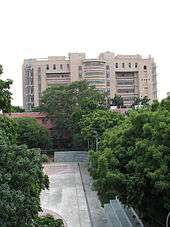
- Dr. Rajendra Prasad Centre for Ophthalmic Sciences:
Establisted in 1967 by the Ministry of Health and Family Welfare, it is a 300-bed ophthalmic (eyes) specialty centre.[27]
- Dr. BR Ambedkar Institute Rotary Cancer Hospital:
It specialises in the treatment of cancer and hosts departments viz. surgical, medical and radiation oncology.
- Jai Prakash Narayan Apex Trauma Centre:
It is India's first full-fledged centre to treat victims of trauma. It is located about 1 km west of the main campus.[28]
- Centre for Dental Education and Research:
Located adjacent to the Hostels, is AIIMS' newest specialty centre. The centre commenced a 4-year collaboration with WHO for oral health promotion. The Ministry of Health and Family Welfare of the Government of India designated this Centre as National Centre for Excellence for implementation of National Oral Health Programme in the country. This centre provides technical support on oral health to the government and WHO. Despite having very few faculty members, this centre has been giving best research output per person in the country.
- Cardiothoracic and Neurosciences Centre:
Offers superspecialty patient care, training and research in the respective fields.
- National Drug Dependence Treatment Centre, Ghaziabad:
It is a WHO collaborating centre on substance abuse.[29]
- Centre for Community Medicine, Ballabhgarh:
It maintains a teaching and treatment facility at Ballabgarh, which is a periurban area outside Delhi, it also provides comprehensive services to 84000 population. Faculty members from AIIMS are posted there by rotation.
Academics
Admissions
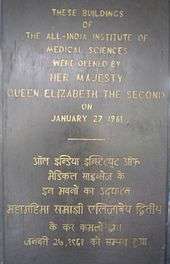
AIIMS was originally established as a superspecialty tertiary care centre with primary emphasis on research and specialised training facilities. MBBS is the basic medical course at bachelor's degree level. This is followed by master's degree level specialisation in general surgery, general internal medicine, pediatrics and other fields. Superspecialties are those healthcare fields whose practitioners need specialised certification after completing their postgraduations, examples being cardiothoracic and vascular surgery, rheumatology, neurology, and pediatric neurology. There are at least 45 superspecialties at AIIMS at higher master's degree level. AIIMS also offers M.Sc. and PhD level research courses.
There are about forty-two specialty post-graduate courses conducted at AIIMS. The entry is through a nationwide competitive examination, AIIMS PG, held every six months.[30] Each year nearly 50 thousand medical graduates and 25 thousand dental graduates across the country compete for the limited number of positions, approximately <1% of the candidates are admitted through the process. The Institute announced that the test would be conducted in both online and paper-and-pen modes from May 2013 onwards.
AIIMS publishes The National Medical Journal of India.[31] Several journals in medical sciences are edited by AIIMS faculty.
Residential facilities
AIIMS is a residential university where the faculty members, staff, and students live on either the main campus or one of the several extension campuses. At undergraduate level there is accommodation for total 400 students in 7 hostels, 6 male (Hostels No.1-6) and one female hostel (Hostel 10). At post-graduate level there are 3 hostels, 1 hostel for female students (Hostel No.9) and 2 hostels for single male or married couples (Hostels No.7-8). Additional hostels for nursing students and post-graduate students are available at a facility in the Masjid Moth area, near the main AIIMS campus. Ballabgarh campus has hostels at Ballabgarh, Dayalpur and Chainsa for MBBS, MD, and nursing students deputed there.
Student life
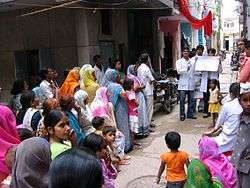
Attendance is compulsory and emphasis on participating in research activities, under the professors at AIIMS or elsewhere, from undergraduate years. Class size is limited 73 (MBBS) + 10 (MTR) + 19 (OPH) per year. Men constitute nearly 80% of student population. AIIMS has a cosmopolitan culture with students from allover India as well as from other nations such as Malaysia, Indonesia, Nepal, Bhutan, Afghanistan, Mauritius and more. A variety of Indian cultural festivitals and most major international festivals are celebrated.
The students are represented by the AIIMS Students' Union, headed by an executive committee that is elected every year from students of 6th semester. Pulse, the annual inter-college festival is hosted by AIIMS, with daily attendance ranging from 15000 to 45000. The students annually host Infest, a scaled down version of Pulse with only internal participation. The students' body frequently hosts literary games, dance classes, and arranges coaching for sports.
AIIMS has large well-equipped gym, swimming pool, tennis courts, basketball, volleyball, squash and soccer. The hostel also have a library.
Controversies
Around 2002 AIIMS decision to reserving 33% of post-graduation seats for its own undergraduate MBBS students, resulted in a controversy as it practically resulted in a 100% reservation for subjects, was struck down by the Supreme Court of India.[32] In 2006 Union Health Minister Anbumani Ramadoss, who was a supporter of 27% reservation for Other Backward Classes,[33] caused a controversy when he replaced P. Venugopal with T. D. Dogra as Director of AIIMS. The initial personality conflict between Ramadoss and Venugopal later become politicised as a conflict on reservation issue,[34] as anti-reservation students and faculty of AIIMS went on strike in favor of Venugopal.[35] The issue was put to rest when Venugopal was reinstated by the Supreme Court.[36]
Notable officials and alumni
Directors of AIIMS Delhi
- Bhalchandra Babaji Dikshit (1956–64), Padma Bhushan, founder Director
- K. L. Wig (1964–69), Padma Vibhushan, first Dean of the Faculty
- V. Ramalingaswami (1969-1979), Padma Vibhushan, first Director-General of Indian Council of Medical Research
- L. P. Agarwal (1979–80)
- H. D. Tandon (1980-1984)
- S. Bhargava (1984-1990)
- S. Kakkar (1990-1995)
- L. M. Nath (1995-1996)
- L. K. Bhutani (1996)
- P. K. Dave (1996-2003)
- P. Venugopal (2003-2007) (May–June 2008), Padma Bhushan
- Tirath Das Dogra (2007-2009), forensic expert of India
- Ramesh C. Deka (2009-2013)
- M. C. Misra (2013-2017)
- Randeep Guleria (2017–present)
Faculty
- Abul K Abbas, Chair of Department of Pathology at University of California San Francisco
- Alka Kriplani, Padma Shri recipient
- Ashok Kumar Hemal, Padma Shri recipient
- Atul Kumar, Padmashri recipient
- Autar Singh Paintal, physiologist
- B. N. B. Rao, Padma Shri recipient
- Deepak Chopra, popular spiritual guru
- Jitendra Nath Pande
- K. Srinath Reddy, Padma Bhushan recipient and Head of Public Health Foundation of India
- Ramesh Bijlani
- Randeep Guleria
- Sanjiv Chopra, Dean of Continuing Medical Education at Harvard Medical School
- Tirath Das Dogra, forensic pathologist
- Vinay Kumar, Chair of Pathology Department at University of Chicago
- Vipin Buckshey Padma Shri recipient
- Sujata Sharma, N-Bios laureate[37]
- Naval Kishore Vikram, N-Bios laureate[38]
Alumni
- Amita Aggarwal, MBBS, MD, N-Bios laureate[39]
- Sathyanarayana Srikanta, MD 1981, Medical Director at Samatvam Endocrinology Diabetes Center[40]
- Rakesh Aggarwal (gastroenterologist), MBBS 1983, National Bioscience Award for Career Development recipient[41]
- Raj Kumar, MCh 1993, funding director of All India Institute of Medical Sciences, Rishikesh.[42]
Recipients of Shanti Swarup Bhatnagar Award for medical research
Following current and former faculty have won the CSIR's Shanti Swarup Bhatnagar Prize for Science and Technology for research:
- Anurag Agrawal, pulmonologist[43]
- B. K. Anand, physiologist
- Maharaj Kishan Bhan, pediatrician
- Turaga Desiraju, neurophysiologist
- Deepak Gaur, molecular biologist[44]
- Ravinder Goswami, endocrinologist[45]
- Satish K. Gupta, immunologist[46]
- Santosh G. Honavar, ocular oncologist[47]
- T. C. Anand Kumar, reproductive biologist[48]
- Anil Kumar Mandal, ophthalmologist
- Narinder Kumar Mehra, immunologist[49]
- Nuggehalli Raghuveer Moudgal, endocrinologist[50]
- Indira Nath, founder head of Biotechnology Department in AIIMS[51]
- Subrat Kumar Panda, virologist[52]
- V. Ramalingaswami, pathologist
- Pradeep Seth, microbiologist, developed HIV vaccine
- Y. D. Sharma, molecular biologist[53]
- Janak Raj Talwar, cardiovascular surgeon[54]
- Shashi Wadhwa, neuroscientist[55]
See also
References
- ↑ "The All India Institute of Medical Sciences Act, 1956" (PDF). 2 June 1956.
- ↑ "The Telegraph - Calcutta : Frontpage". www.telegraphindia.com. Retrieved 21 June 2017.
- 1 2 "India's Best Colleges 2017: Medical". India Today. 2017. Retrieved 21 June 2017.
- 1 2 "Top 25 Medical Colleges In 2017". Outlook India. 5 June 2017. Retrieved 21 June 2017.
- 1 2 Singh, Abhinav (18 June 2017). "The Week - Hansa Research Best Colleges Survey 2017: Top Medical Colleges - All India". The Week. Retrieved 8 September 2017.
- ↑ Venugopal, P. (1 September 1994). "The first successful heart transplant in India". The National Medical Journal of India. 7 (5): 213–215. PMID 7827600. Retrieved 21 June 2017 – via PubMed.
- ↑ "AIIMS claims cutting edge stem cell study". The Times of India. 23 March 2005.
- ↑ "Stem cell therapy – Hope and scope in pediatric surgery Gupta DK, Sharma S, – J Indian Assoc Pediatr Surg". Retrieved 21 June 2017.
- ↑ Kaul, Vividha (24 February 2005). "AIIMS pioneers stem cell injection". The Times of India.
- ↑ Archived 4 July 2008 at the Wayback Machine.
- ↑ Mitra, Prithvijit (7 July 2008). "City hospitals plan robotic surgery". The Times of India.
- ↑ "AIIMS Creates Record by Completing 100 Four-arm Robotic Surgeries ( New Delhi: The All India Institute of M...)". www.bio-medicine.org. Retrieved 21 June 2017.
- ↑ "Archive News - The Hindu". The Hindu. Retrieved 21 June 2017.
- ↑ "Haryana offers free land for 2nd AIIMS campus". The Times of India. 11 Feb 2009. Retrieved 19 March 2013.
- ↑ "AIIMS-II launched in Haryana village". The Times of India. 25 May 2012. Retrieved 25 May 2012.
- ↑ "Work on AIIMS II project likely to begin on May 30". The Times of India. 25 May 2012. Retrieved 25 May 2012.
- ↑ "AIIMS begins OOPD at Jhajjar". The Times of India. 25 November 2012.
- ↑ Azad inaugurates Outreach OPD of AIIMS in Haryana. Business Standard (24 November 2012). Retrieved on 9 October 2013.
- ↑ "AIIMS cancer centre in Jhajjar - Times of India". Retrieved 21 June 2017.
- 1 2 AIIMS Introduction, AIIMS.
- ↑ "AIIMS Fridabad", National Informatics Centre.
- ↑ "Profile: The Ballabgarh Health and Demographic Surveillance System (CRHSP-AIIMS).", Indepth Network.
- ↑ AIIMS Ballabhgarh CRHS
- ↑ "Healthcare expenses paralyse family finances: AIIMS study.", Financial Express, 31 Aug 2017.
- 1 2 "AIIMS: Ailing Institute.", The Tribune, 6 Oct 2007.
- ↑ "ALL INDIA INSTITUTE OF MEDICAL S". www.aiims.edu. Retrieved 21 June 2017.
- ↑ Natarajan, Sundaram (2017-02-01). "Celebrating excellence". Indian Journal of Ophthalmology. 65 (2). doi:10.4103/ijo.ijo_177_17.
- ↑ Delhilive.com on AIIMS Trauma Centre Archived 29 October 2014 at the Wayback Machine.
- ↑ "WHOCC - WHO Collaborating Centres". apps.who.int. Retrieved 21 June 2017.
- ↑ "All India Institute Of Medical Sciences - AIIMS-EXAM". Careerconvey. Retrieved 21 November 2017.
- ↑
- ↑ Supreme Court Judgment regarding 33% reservation
- ↑ "Quota row halts appointment of docs in AIIMS". Economic Times. Jul 8, 2007. Retrieved 15 May 2014.
- ↑ "Destroying AIIMS". India Today. July 17, 2006. Retrieved 15 May 2014.
- ↑ "Anti-quota stir continues as Arjun refuses rollback". Retrieved 21 June 2017.
- ↑ "Bitter pill for Ramadoss, Venugopal reinstated". May 2008. Retrieved 15 May 2014.
- ↑ "Sujata Sharma on AIIMS". AIIMS New Delhi. 2018-01-30. Retrieved 2018-01-30.
- ↑ "NASI fellow nomination" (PDF). National Academy of Sciences, India. 2018-02-03. Retrieved 2018-02-03.
- ↑ "Current faculty". Sanjay Gandhi Postgraduate Institute of Medical Sciences. 2017-12-16. Retrieved 2017-12-16.
- ↑ "Dr. Sathyanarayana Srikantha". fbae.org. Retrieved 21 June 2017.
- ↑ "Professor Rakesh Aggarwal on WHO". World Health Organization. Retrieved 2017-12-09.
- ↑ Jamal Ayub (30 August 2012). "Government appoints directors of AIIMS-like institutes". The Times of India. Retrieved 14 September 2012.
- ↑ "Wellcome DBT - View Main - Profile". www.wellcomedbt.org. 2018-01-05. Retrieved 2018-01-05.
- ↑ "Deepak Gaur".
- ↑ "The Journal of Clinical Endocrinology & Metabolism :". press.endocrine.org. 2017-12-16. Retrieved 2017-12-16.
- ↑ "Indian fellow - S K Gupta". Indian National Science Academy. 2017.
- ↑ Rajvi H. Mehta (March 2010). "Dr T.C. Anand Kumar - a doyen in reproductive biology" (PDF). Indian J Med Res. 131: 446–467.
- ↑ "Indian fellow - N. K. mehra". Indian National Science Academy. 2017.
- ↑ "Nuggehalli Raghuveer Moudgal (1931–2011)" (PDF). Current Science. 2011. pp. 109–110.
- ↑ "Indian Fellow - Indira Nath". Indian National Science Academy. Retrieved 10 March 2013.
- ↑ "Indian fellow - S K Panda". Indian National Science Academy. 2017.
- ↑ "Indian fellow - Y D Sharma". Indian National Science Academy. 2017.
- ↑ J. S. Guleria (2017). "Obituary" (PDF). National Databases of Indian Medical Journals.
- ↑ "Prof. Shashi Wadhwa". www.aiims.edu. Retrieved 2017-12-16.
